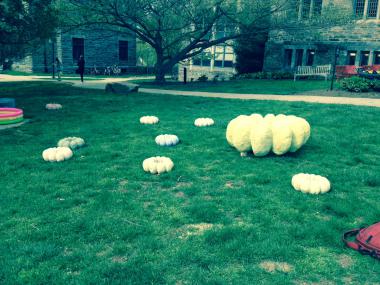thoughts on names & questions about appropriation (LaDuke)
By caleb.eckertApril 13, 2015 - 18:44

Some thoughts on Winona LaDuke (whom I want to hear more from in the near future)…
Serendip is an independent site partnering with faculty at multiple colleges and universities around the world. Happy exploring!

Some thoughts on Winona LaDuke (whom I want to hear more from in the near future)…

"The schoolishness of the literacy performances in The Attic was apparent in the balance of collaboration between adults and youth. In the least school-like literacy performances, youth created the texts and/or initiated the reading or writing of them. In the most schoolish literacy performances, adults assumed these responsibilities. Most often, though infrastructure was established by adult staff members and youth decided whether to engage with it, and if so, how. Then, adults adapted the infrastructure to foster youth engagement." (Blackburn, 41)

Something that I appreciated in Molly Blackburn’s work, Interrupting Hate, was the reference to the idea of continual work involved in allyship. Blackburn states, “An ally must perform being an ally repeatedly, and what an ally performance looks like in one space…is different than it is in another” (p. 62) being an ally is not simply done once. There is a constant need to reevaluate, and connect when being an ally. It is an active position that calls for teachers and students to engage, listen, reflect, educate, and act with fluidity understanding the importance of context and the merit and personal specificity in regards to the environments both inside and outside the classroom and its connection to literature.
I do not think TFA is an effective model. I don't form this opinion solely from this week's readings, but from experience with people in the program who have been subjected to poor support structures and even removed from their schools within the first few months. The reading only reinforces my feelings on the subject. However, I also think its important to not be so quick to criticize the program as Ravitch does in her article. Like Kopp says, there are many TFA alums still in education who are effective members of the field.

I have really enjoyed reading Blackburn’s book, and have been particularly struck by two parts: how hard students must work (and how much opposition they face) in trying to academically explore topics that touch on anything involving LGBTQ(IA) individuals, and also by the Speakers Bureau Program.

except I'm still having trouble just *being here,* am still time traveling...
to last spring, when the bundt cakes were in action here.
In reading Crawford-Garrett's book, I was struck by the distancing that was going on between the TFA corps members and the students and families in the surrounding community. Some of the corps members seemed unable to empathize with these families and see ways in which they supported and loved their children that may have differed from how the corps members themselves were raised. One corps member, Wendy, was disturbed by the children's lack of access to "classic" children's literature and the lack of what she conceived of as literacy in their homes. But, as Crawford-Garrett writes, "Wendy was viewing literacy primarily as a set of skills or activities that we acquire rather than something that we put to use in our interactions with others.

I really appreciated Blackburns's emphasis on teaching to become an ally. It is all too often in schools that we are taught what not to do intstead of what to do. Often times people learn about the histories and meanings behind certain words and actions after they have used them. Standing up to someone who uses derrogative terminology or who acts homophobic is often hard for people to do and doesn't happen enough. Additionally, correcting someone and trying to teach him/her often comes off as an attack, leading that person to become defensive and not listen and learn. Most high schools have a bullying segment of the curriculum or different bullying workshops. Why not teach about being an ally then?
Silvi Shameti
Schools in American Cities
Film Analysis - Freedom Writers